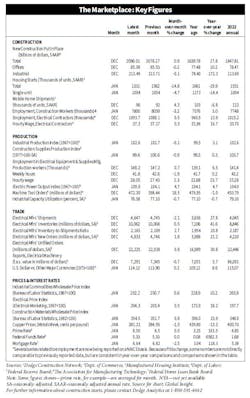Electrical Marketing's Leading Economic Indicators - Feb. 23, 2024 Update
Single-family building permits rise +1.6% over December
Single-family building permits in January were at a seasonally adjusted annual rate of 1,015,000, +1.6% above the revised December figure of 999,000.
Business conditions remain soft at AIA architects
Architecture firm billings remained soft entering into 2024, with an AIA/Deltek Architecture Billings Index (ABI) score of 46.2 points in January. Any score below 50 points indicates decreasing business conditions.
“This now marks the lengthiest period of declining billings since 2010, although it’s reassuring that the pace of this decline is less rapid and the broader economy showed improvement in January,” said Kermit Baker, AIA’s chief economist, in the press release. “Firms are seeing growth with inquiries into new projects and value of newly signed design contracts is holding steady, showing potential signs of interest from clients in new projects.”
The ABI score is a leading economic indicator of construction activity, providing an approximately nine-to-twelve-month glimpse into the future of nonresidential construction spending activity.
Conference Board's leading indicators drop again, but signal that brighter days are ahead
The Conference Board Leading Economic Index (LEI) for the U.S. fell by -0.4% in January 2024 to 102.7 (2016=100), following a -0.2% decline in Dec. 2023. The LEI contracted by -3% over the six-month period between July 2023 and Jan. 2024, a smaller decrease than the -4.1% decline over the previous six months.
“The U.S. LEI fell further in January, as weekly hours worked in manufacturing continued to decline and the yield spread remained negative,” said Justyna Zabinska-La Monica, senior manager, Business Cycle Indicators, at The Conference Board, in the press release.
“While the declining LEI continues to signal headwinds to economic activity, for the first time in the past two years, six out of its 10 components were positive contributors over the past six-month period. As a result, the leading index currently does not signal recession ahead. While no longer forecasting a recession in 2024, we do expect real GDP growth to slow to near zero percent over Q2 and Q3.”

